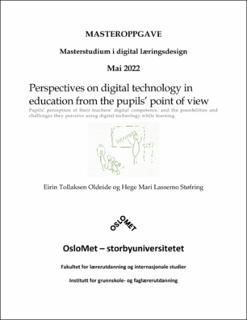Perspectives on digital technology in education from the pupils’ point of view. Pupils’ perception of their teachers’ digital competence, and the possibilities and challenges they perceive using digital technology while learning
Master thesis
Published version
Permanent lenke
https://hdl.handle.net/11250/3012001Utgivelsesdato
2022Metadata
Vis full innførselSamlinger
Sammendrag
Introduction: The use of digital tools and software in schools has increased dramatically since the turn of the century. Norway has one of the world’s highest numbers of digital devices per pupil in schools, and Norwegian classrooms are increasingly dependent on digital technology. However, we could not find much research on the topic of the pupils’ perspectives on the use of ICTs in learning. This thesis aims to raise the pupil’s voice and shed light on their experiences with the use of digital tools in their learning, and their views on their teachers’ digital competence.
Theory and frameworks for analysis: The TPACK framework was chosen as a framework to code and analyse the pupils’ statements about their teachers’ digital competence. Theory on digital classroom management, the potential for disruptions from technology in the classroom and pupils’ motivation and boredom is also used.
Method: The data used in this thesis was collected by the Norwegian DigiGen research group, as a part of a larger study on the impact of digital technology on the lives of children and young people. Data was collected through semi-structured interviews with children in the year of their transition from seventh to eighth grade, or primary to lower secondary school. The interviews were video recorded, and these recordings were used to create written transcripts which were then coded using NVivo.
Main findings: The pupils generally find that their teachers are good enough at using technology in the classroom, and they appreciate teachers who use digital tools efficiently. They are aware of differences in skill levels between their teachers – both when it comes to technological competence and digital classroom management. The pupils mention some challenges with using digital tools in learning, such as the potential for disruption, the risk of being exposed to false information on the Internet and issues with infrastructure, such as the internet connection being slow or unstable. However, they mainly express positive attitudes towards digital tools in learning, and state that digital technology makes learning easier by simplifying writing and editing, providing easy access to information on the Internet and organising tasks and teacher-pupil communication. They find learning with digital technology more motivating, and interestingly, they remark that the use of technology in class can free up time for the teachers to help pupils more.
Utgiver
OsloMet - StorbyuniversitetetBeslektede innførsler
Viser innførsler beslektet ved tittel, forfatter og emneord.
-
Teachers’ instructional practices during pupils’ individual seatwork in Norwegian Language arts
Svanes, Ingvill Krogstad; Klette, Kirsti (Journal article; Peer reviewed, 2017)This study examines teachers’ instructional practices during seatwork in primary Norwegian Language arts classrooms. Although seatwork is a common activity in classrooms, our knowledge about what teachers actually do during ... -
Knowledge about the Greenhouse Effect and the Effects of the Ozone Layer among Norwegian Pupils Finishing Compulsory Education in 1989, 1993, and 2005 : What Now?
Hansen, Pål J. Kirkeby (International Journal of Science Education;32 (3), Journal article; Peer reviewed, 2010-02-03)The greenhouse effect and the effects of the ozone layer have been in the media and public focus for more than two decades. During the same period, Norwegian compulsory schools have had four national curricula. The two ... -
Differentiated Instruction in the English Classroom: Teachers´ and pupils´ understanding and practice of differentiated instruction and its implementation in the English classroom
Majcic, Jasmina (Master thesis, 2020)This master thesis (MA) examines the role of differentiation in the English classroom. Specifically, the main aims of this MA thesis is to analyse how the concept of differentiated instruction is understood and practiced ...
